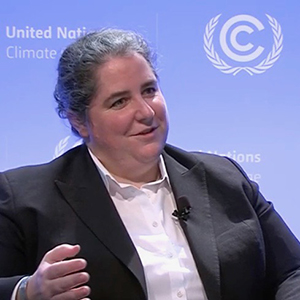Emily Gerrard
 Emily Gerrard
Emily Gerrard
Truth-telling and empowerment
Growing up in regional Victoria, Emily Gerrard developed an innate curiosity about the natural world. Thanks to an astute school careers counsellor, a double degree from UNE and a lot of hard work, she's now effecting environmental change at the local, national and even international level.
From climate change, native title and environmental markets to renewable energy and the trade in carbon credits, Emily's legal work spans a breadth of landscapes and legal jurisdictions. In 2015 she attended the Paris Climate Conference and spoke on a panel at UNESCO's headquarters, and Emily continues to assist some of the world's most vulnerable countries on climate change matters.
"These days, thanks to COVID-19, I don't need to leave home to get jet-lagged," she says. "My attendance at international climate change negotiations at the United Nations now means Microsoft Teams meetings on Central European Time, in the middle of the night."
As the director and a principal lawyer at Comhar Group, an Australian-based legal and policy advisory firm, Emily specialises in environmental and climate change law and works with ASX-listed companies, governments of all persuasions, and Indigenous peoples across the land. For over a decade she worked at Allens, where she was co-head of the firm’s Climate Change practice. Emily has also served as a voluntary advisor to the National Indigenous Climate Change Project and is a non-executive director of the Earthwatch Institute Australia.
It's a wildfire of diverse work that first ignited 20 years ago at UNE, when Emily was exposed to the idea of international environmental and resource law. "I remember thinking at the time, wow, imagine if I got to work on those sorts of things, and now I am," Emily says.
"Given my upbringing, I am unsurprised that I've ended up where I have. I thoroughly enjoyed my science degree at UNE and doing it in parallel with law. It was serendipitous that I started my professional career just before the Kyoto Protocol took effect. I was in the right place at the right time, in a large, multinational firm (Allens), and instructing clients increasingly engaged with climate change."
Working in native title law reacquainted Emily with the subject of her honours thesis, the application of native title to coastal waters. "Some of the matters I now work on involve improving and reforming Aboriginal and Torres Strait Islander peoples' rights in relation to water, fisheries and coastal systems," Emily says. "The threads are traceable back to what I was doing as a student. Now it all makes perfect sense."
Emily has assisted First Nations peoples overseas, but the bulk of her work in this sphere is with Indigenous peoples across Australia - the source of rich life lessons.
"First Nations peoples have managed our country for 60,000-plus years and have rights and interests in the natural environment by virtue of their pre-colonial systems," Emily says. "One part is helping people have their territories and rights recognised, and the other is using the law and legal processes to help Traditional Owner groups build a future for themselves and to negotiate other activities on their country that fit comfortably with their aspirations and priorities. People typically think of mining, but increasingly this involves renewable energy projects, as well as participation in environmental markets."
Since 2019 Emily has been a director of the Carbon Market Institute and she's taken an active role in ensuring that legislation for carbon projects protects the rights of Indigenous peoples. Building the capacity of developing countries at UN climate change negotiations has been another rewarding task.
"Mine is a varied but wonderful existence," Emily says. "Much of my work has centred on ensuring that people have the best seat at the table they can get and access to the advice and information they need. To me, it's incredibly important that they are empowered, speak for themselves and make their own decisions. I have a firm belief in respecting the cultural paradigm that I am working within."
In the rapidly evolving era of climate change law and policy, Emily says her science background has proven extremely useful. "It brings a degree of systematic thinking to things; I can see how the biophysical environment and the law need to marry," she says.
But the ancient wisdom of our First Nations people continues to surpass the wonders of modern science.
"Over the past three years I had the incredible privilege of working with a gentleman from the Northern Territory who was heavily involved in drafting the Uluru Statement from the Heart, on cases involving the implementation of rights to traditional sea country," Emily says. "And one day he made the point that Australia shouldn't think about truth-telling as losing 200 years of European history. Instead, he liked to think of it as our nation gaining more than 65,ooo years of history.
"We have a huge amount to learn from Aboriginal and Torres Strait Islander peoples - including their long-term perspective, patience, knowledge and incredible generosity, and definitely truth-telling. Some of the stories I have been told are incredibly unpleasant; others are amazing and adventurous, but there are hard things we need to talk about."
It starts, Emily believes, with simply listening and hearing and believing. "This is incredibly important to Australia moving forward as a country, to hear stories and to have a truth-telling and reconciliation process, and to respect and learn from the history of Aboriginal and Torres Strait Islander peoples," she says.
Helping Australian courts to recognise Indigenous peoples’ rights, interests and cultural responsibilities for their traditional country, is "an incredibly rewarding process" for Emily. "But there's a huge level of satisfaction that comes with contributing to the way law and policy is shaped at any level," she says. "I see myself very much as a conduit; my role as a lawyer is to give someone else a voice in a forum, to advocate for them but also to empower them."

